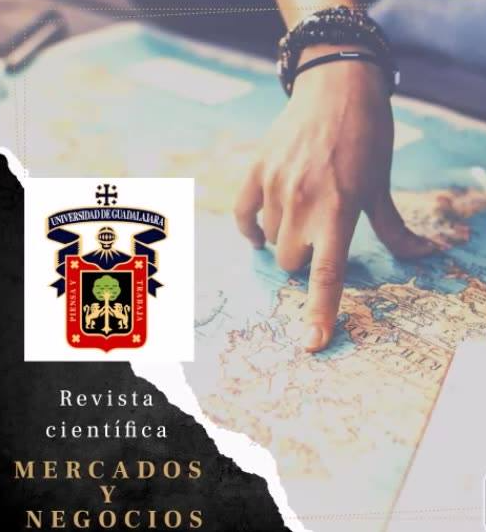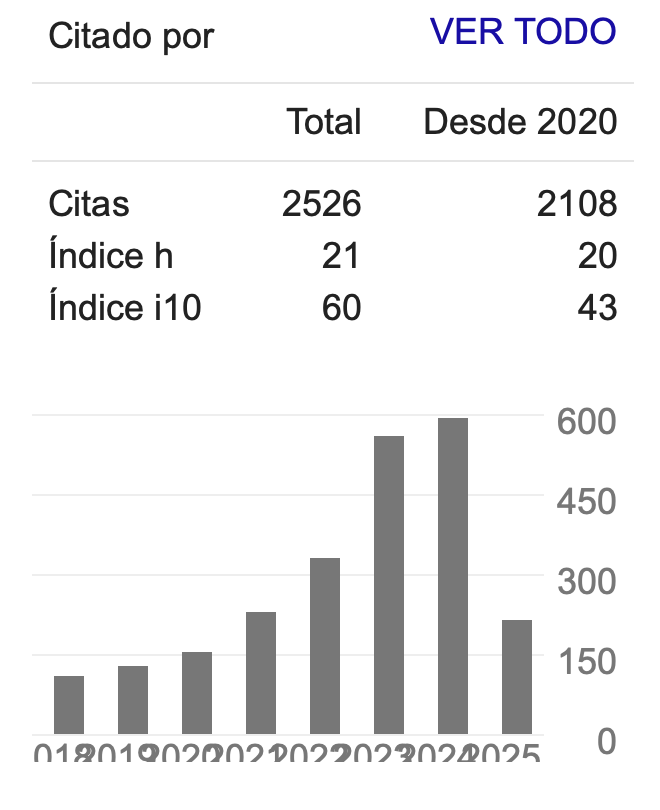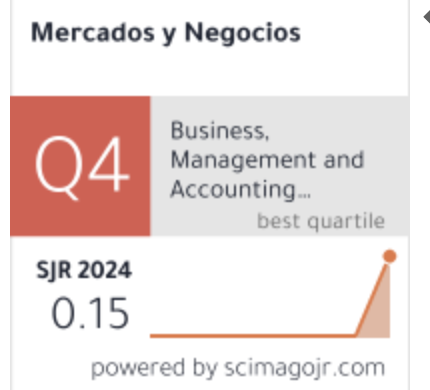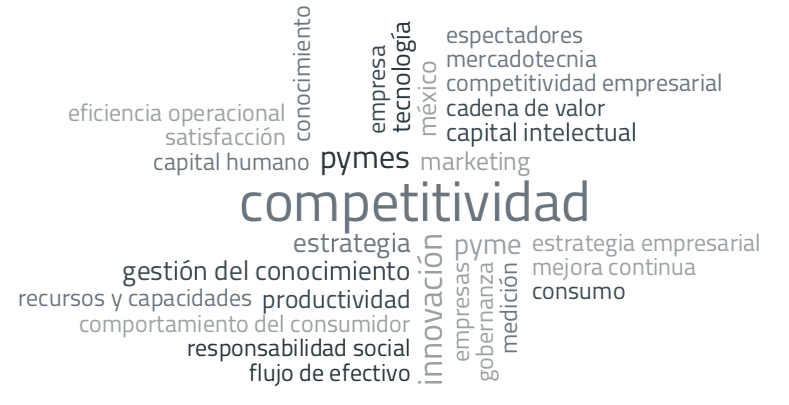Tacit and Explicit Knowledge: Drivers of the Competitiveness of Universities
DOI:
https://doi.org/10.32870/myn.vi50.7708Keywords:
Knowledge Management, Competitiveness, UniversitiesAbstract
This research examines these two cognitive dimensions through a confirmatory factor analysis to determine whether their relationship with the competitiveness variable is suitable for generating genuine competitive elements. These variables have been reviewed based on available cutting-edge literature and collected a priori from Mexican higher education institutions. Cognitive elements serve as precursors to competitiveness; however, comprehending this necessitates an analysis of the cognitive asset from a dimensional perspective, wherein formal and informal knowledge criteria are scientifically established as explicit and tacit knowledge.References
Alves, R. B., & Pinheiro, P. (2022). Factors influencing tacit knowledge sharing in research groups in higher education institutions. Administrative Sciences, 12(3), 89.
Alzahrani, K., Abutalib, R., Elsheikh, A., Alzahrani, L., & Khoshhal, K. (2023). The need for non-technical skills education in orthopedic surgery. BMC Medical Education, 21(1), 1-26. https://doi.org/10.1186/s12909-023-04196-2
Demchig, B. (2015). Knowledge management capability level assessment of the higher education institutions: Case study from Mongolia. Procedia – Social and Behavioral Sciences, 174, 3633-3640.
https://doi-org.wdg.biblio.udg.mx:8443/10.1016/j.sbspro.2015.01.1082
Elezi, E. (2021). Role of knowledge management in developing higher education partnerships: Towards a conceptual framework. Systems Research and Behavioral Science, 38(3), 279-273. https://doi.org/10.1002/sres.2782
Gamble, J. R. (2020). Tacit vs explicit knowledge as antecedents for organizational change. Journal of Organizational Change Management, 33(6), 1123–1141. https://doi.org/10.1108/jocm-04-2020-0121
Ganguly, A., Talukdar, A., & Chatterjee, D. (2019). Evaluating the role of social capital, tacit knowledge sharing, knowledge quality and reciprocity in determining innovation capability of an organization. Journal of Knowledge Management. https://doi.org/10.1108/jkm-03-2018-0190
Gil-Cordero, E., Ledesma-Chaves, P., Ortega-Gutiérrez, J., & Heesup, H. (2023). Organizational value and participatory leadership for sustaining the competitive advantages of hospitality and tourism companies. Humanities and Social Sciences Communications, 10(1). https://doi.org/10.1057/s41599-023-01881-x
Harsh, O. K. (2007). Three-Dimensional Explicit Knowledge Management and Reuse. International Conference on Knowledge Management in Organization, Lecee, Italy, September 10-11, 2007.
Hartono, B.Y., Siagian, H., & Tarigan, Z.J.H. (2023). The effect of knowledge management on firm performance. mediating role of production technology, supply chain integration, and green supply chain. Uncertain Supply Chain Management, 11, 1133-1148. https://doi.org/10.5267/j.uscm.2023.4.009
Houessou, A.M., Aoudji, A.K., Biaou, G. & Floquet, A. (2023). Tacit knowledge acquisition and incremental innovation capability: Proximity perspective. Journal of Open Innovation: Technology, Market and Complexity, 9(3). https://doi.org/10.1016/j.joitmc.2023.100085
Kireeva, N., Slepenkova, E., Shipunova, T., & Iskandaryan, R. (2018). Competitiveness of higher education institutions and academic entrepreneurship. Espacios, 39(23), 15-29.
Kovalenko, A. I. (2013). Theoretical and Methodological Aspects of Application of the Concept of "Competitive Ability" in Scientific Research. Journal of Modern Competition, 6(42), 65-79.
Lebedinskaya, Y. S., & Petruk, G. V. (2019). Methodological tool development to improve competitiveness of university international activities. Amazonia Investiga, 8(22), 261-268.
Li, L., & Zhao, N. (2023). Explicit and tacit knowledge have diverging urban growth patterns. NPJ Urban Sustainability, 3(1), 1-29. https://doi.org/10.1038/s42949-023-00116-x
Magnier-Watanabe, R., & Benton, C. (2017). Management innovation and firm performance: The mediating effects of tacit and explicit knowledge. Knowledge Management Research and Practice, 15(3), 325-335. https://doi.org/10.1057/s41275-017-0058-6
Mahdi, O. R., Nassar, I. A., & Almsafir, M. K. (2018). Knowledge management processes and sustainable competitive advantage: An empirical examination in private universities. Journal of Business Research. https://doi.org/10.1016/j.jbusres.2018.02.013
Mostofa, S.K.M., Othman, R. & Zulkifli, Z. (2023). Knowledge Management: Determine the Influencing Factors for Practicing at the Libraries in Bangladesh. Journal of Education, Culture and Society, 14(1), 672-696. https://doi.org/10.15503/jecs2023.1.672.696
Nawaz, N., Durst, S., Hariharasudan, A. & Shamugia, Z. (2020). Knowledge Management Practices in Higher Education Institutions - A Comparative Study. Polish Journal of Management Studies, 22(2), 291-308. https://doi.org/10.17512/pjms.2020.22.2.20
Niqresh, M. (2021). The reality of applying knowledge management practices and its impact on achieving the quality of higher education in Jordan. Journal of educational and social research, 11(1), 9-22. https://doi.org/10.36941/jesr-2021-0002
Nonaka, I., & Takeuchi, H. (1995). The knowledge creating company. Oxford University Press.
Ogutu, H., Adol, G.F., Bujdoso, Z., Benedek, A., Fekete-Farkas, M., & Dávid, L.D. (2023). Theoretical Nexus of Knowledge Management and Tourism Business Enterprise Competitiveness: An Integrated Overview. Sustainability, 15(3), 1948. https://doi.org/10.3390/su15031948
Ordóñez de Pablos, P., & Lytras, M. (2018). Knowledge management, innovation, and big data: Implications for sustainability, policy making and competitiveness. Sustainability, 10(6), 2073.
Poonam, V.R. & Rowley, J. (2018). Knowledge management in higher education institutions in Mauritius. The International Journal of Educational Management, 32(7), 1319-1332. https://doi.org/10.1108/IJEM-05-2017-
Quarchioni, S., Paternostro, S., & Trovarelli, F. (2020). Knowledge management in higher education: a literature review and further research avenues. Knowledge Management Research & Practice, 1–16. https://doi.org/10.1080/14778238.2020.1730717
Raudeliuniene, J. & Matar, I. (2022). Knowledge Management Practice for Sustainable Development in Higher Education Institutions: Women Managers’ Perspective. Sustainability, 14(19), 1231. https://doi.org/10.3390/su141912311
Reber, P. (2013). The neural basis of implicit learning and memory: A review of neuropsychological and neuroimaging research. Neuropsychologia, 51, 2026–2042. https://doi.org/10.1016/j.neuropsychologia.2013.06.019
Rodríguez-Ponce, E., Pedraja-Rejas, L., Muñoz-Fritis, C., Araneda-Guirriman, C. (2022). Gestión del conocimiento y cultura organizacional en instituciones de educación superior chilenas. Ingeniare: revista chilena de ingeniería, 30(2), 266-278. https://doi.org/10.4067/S0718-33052022000200266
Roediger, H. (1990). Implicit memory: Retention without remembering. American Psychologist, 45, 1043. https://doi.org/10.1126/science.7414331
Rubio-Andrés, M., & Abril, C. (2023). Sustainability oriented innovation and organizational values: a cluster analysis. Journal of Technology Transfer. https://doi.org/10.1007/s10961-022-09979-1
Sachin, S., & Manoj, M. (2019). The role of knowledge management in institutional strategy development and competitiveness at leading African universities. Knowledge and performance management, 3(1), 19-30. https://doi.org/10.21511/kpm.03(1).2019.03
Schiuma, G., Carlucci, D., & Lerro, A. (2012). Managing knowledge processes for value creation. VINE Journal of Information and Knowledge Management Systems, 42(1), 4–14.
Sedziuviene, N., & Vveinhardt, J. (2009). The Paradigm of Knowledge Management in Higher Educational Institutions. Inzinerine Ekonomika-Engineering Economics, 5, 79-90.
Sial, M.A., Paul, Z.I., Rafiq, Z., & Abid, G. (2023). Does mobile technology shape employee socialization and enable tacit knowledge sharing in public sector organizations. Journal of Open Innovation: Technology, Market and Complexity, 9, 1-11. https://doi.org/10.1016/j.joitmc.2023.100089
Situmorang, R., & Japutra, A. (2024). Knowledge transfer within MNC hotel subsidiaries: An absorptive capacity perspective. Tourist Management, 100. https://doi.org/10.1016/j.tourman.2023.104794
Somech, A., & Bogler, R. (1999). Tacit Knowledge in Academia: Its Effects on Student Learning and Achievement. The Journal of Psychology, 133(6), 605-616. https://doi.org/10.1080/00223989909599766.
Stelmaszczyk, M., Pier´scieniak, A., & Krzysztofek, A. (2021). Managerial Energy in Sustainable Enterprises: Organizational Wisdom. Approach. Energies, 14, 2367. https://doi.org/10.3390/en14092367
Štimac, H., & Šimić, M.L. (2012). Competitiveness In Higher Education: A Need for Marketing Orientation and Service Quality. Economics and Sociology, 15(2), 23-34.
Vasiliev, A. (2022). Designing the University Competitiveness Management System: Functions, Levels, Objects. International Journal of Instruction, 15(4).
Vega, J., Gutiérrez, A., & Fernández, I. (2009). Estrategias de adquisición de conocimiento en los procesos de innovación. ARBOR: Ciencia Pensamiento y Cultura, 185(738), 781-793. https://doi.org/10.3989/arbor.2009.738n1052
Wang, T., Skulstad, R., Kanazawa, M., Li, G. & Zhang, H. (2023). Knowledge transfer strategy for enhancement of ship maneuvering model. Ocean Engineering, 283. https://doi.org/10.1016/j.oceaneng.2023.115122
Xiao, H. (2006). Towards a Research Agenda for Knowledge Management in Tourism. Tourism and Hospitality Planning & Development, 3(2), 143-157
Published
How to Cite
Issue
Section
License
Copyright (c) 2023 Manuel Ortiz Barrera

This work is licensed under a Creative Commons Attribution-NonCommercial 4.0 International License.
Mercados y Negocios by Department of Mercadotecnia y Negocios Internacionales. University of Guadalajara is licensed under a License Creative Commons Attribution-NonCommercial 4.0 International.
The author retains the copyright.








